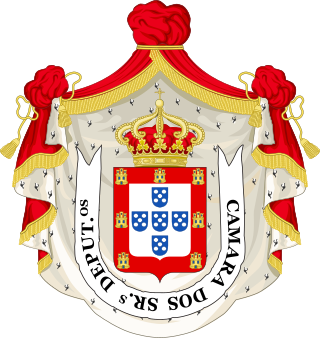
The speaker of a deliberative assembly, especially a legislative body, is its presiding officer, or the chair. The title was first used in 1377 in England.
A lower house is the lower chamber of a bicameral legislature, where the other chamber is the upper house. Although formally styled as "below" the upper house, in many legislatures worldwide, the lower house has come to wield more power or otherwise exert significant political influence.

The Senate of the Republic, or simply the Senate, is the upper house of the bicameral Italian Parliament, the lower house being the Chamber of Deputies. The two houses together form a perfect bicameral system, meaning they perform identical functions, but do so separately. Pursuant to the Articles 57, 58, and 59 of the Italian Constitution, the Senate has 200 elective members, of which 196 are elected from Italian constituencies, and 4 from Italian citizens living abroad. Furthermore, there is a small number of senators for life, either appointed or ex officio. It was established in its current form on 8 May 1948, but previously existed during the Kingdom of Italy as Senato del Regno, itself a continuation of the Senato Subalpino of Sardinia established on 8 May 1848. Members of the Senate are styled Senator or The Honourable Senator and they meet at Palazzo Madama, Rome.

The Chamber of Deputies is the lower house of the bicameral Italian Parliament, the upper house being the Senate of the Republic. The two houses together form a perfect bicameral system, meaning they perform identical functions, but do so separately. The Chamber of Deputies has 400 seats, of which 392 are elected from Italian constituencies, and 8 from Italian citizens living abroad. Deputies are styled The Honourable and meet at Palazzo Montecitorio.

The Italian Parliament is the national parliament of the Italian Republic. It is the representative body of Italian citizens and is the successor to the Parliament of the Kingdom of Sardinia (1848–1861), the Parliament of the Kingdom of Italy (1861–1943), the transitional National Council (1945–1946) and the Constituent Assembly (1946–1948). It is a bicameral legislature with 600 elected members and a small number of unelected members. The Italian Parliament is composed of the Chamber of Deputies, as well as the Senate of the Republic.

The Treaty of Accession 2005 is an agreement between the member states of European Union and Bulgaria and Romania. It entered into force on 1 January 2007. The Treaty arranged accession of Bulgaria and Romania to the EU and amended earlier Treaties of the European Union. As such it is an integral part of the constitutional basis of the European Union.

The Chamber of Deputies, officially the Chamber of Deputies of the Parliament of the Czech Republic, is the lower house of the Parliament of the Czech Republic. The chamber has 200 seats and deputies are elected for four-year terms using the party-list proportional representation system with the D'Hondt method. Since 2002, there are 14 constituencies, matching the Czech regions. A Cabinet is answerable to the Chamber of Deputies and the Prime Minister stays in office only as long as they retain the support of a majority of its members. The quorum is set by law to one third (67) of elected deputies. Any changes to the constitutional laws must be approved by at least 60 percent of the Chamber of Deputies. The seat of the Chamber of Deputies is the Thun Palace in Malá Strana, Prague.

Palazzo Madama in Rome is the seat of the Senate of the Italian Republic, the upper house of the Italian Parliament.

Palazzo Carignano is a historical building in the centre of Turin, Italy, which houses the Museum of the Risorgimento. It was a private residence of the Princes of Carignano, after whom it is named. Its rounded façade is different from other façades of the same structure. It is located on the Via Accademia delle Scienze.

The Senate of the Kingdom of Italy was the upper house of the bicameral parliament of the Kingdom of Italy, officially created on 4 March 1848, acting as an evolution of the original Subalpine Senate. It was replaced on 1 January 1948 by the present-day Senate of the Republic. All of its members were appointed by the King.

Chamber of Fasces and Corporations was the lower house of the legislature of the Kingdom of Italy from 23 March 1939 to 5 August 1943, during the height of the regime of Benito Mussolini's National Fascist Party.

Sebastiano Tecchio, was an Italian lawyer and politician that was president of the Italian Senate from 1876 to 1884.

The Subalpine Senate was the upper house of the Kingdom of Sardinia and one of the two houses of its bicameral parliament, the other being the Chamber of Deputies. It was set up in 1848 following the fusion of the Savoyard states. It became the Senate of the Kingdom of Italy upon the unification of Italy in 1861. It is the direct ancestor of the present Italian Senate. Its name was a reference to the Napoleonic Subalpine Republic.

The Chamber of Deputies of Portugal, alternatively translatable as the House of Commons and formally styled the Chamber of the Gentlemen Deputies of the Portuguese Nation was the lower house of the Cortes Gerais, the legislature of the Kingdom of Portugal during most of the constitutional monarchy period. The Chamber of Deputies directly represented the Portuguese Nation, elected through direct suffrage of the electoral circuits corresponding to the districts of Portugal. During the First Republic, the Chamber of Deputies was remodeled after the US House of Representatives.

The Chamber of Deputies of the Kingdom of Italy was the main legislative body of the Kingdom of Italy descended from the lower house of the Kingdom of Sardinia, but supplemented with deputies from territories captured during the Second Italian War of Independence and the Expedition of the Thousand. Along with the Senate of the Kingdom of Italy, it formed the Parliament of the Kingdom of Italy from 1861 until 1939.

The Parliament of the Kingdom of Sardinia, also called Subalpine Parliament, was the bicameral parliament of the Kingdom of Sardinia.

The Parliament of the Kingdom of Italy was the bicameral parliament of the Kingdom of Italy. It was established in 1861 to replace the Parliament of the Kingdom of Sardinia and lasted until 18 June 1946, when it was replaced by the present-day Italian Parliament. It was formed of a lower house and an upper house.

The proclamation of the Kingdom of Italy happened with a normative act of the Savoyard Kingdom of Sardinia — the law 17 March 1861, n. 4761 — with which Victor Emmanuel II assumed for himself and for his successors the title of King of Italy. 17 March is commemorated annually by the anniversary of the unification of Italy, a national holiday established in 1911 on the occasion of the 50th anniversary, and also celebrated, in the Republican era, in 1961 and 2011.















